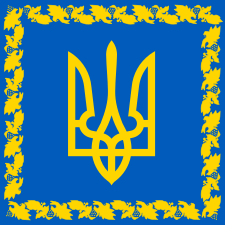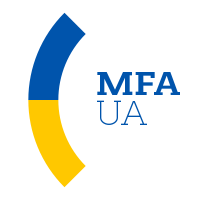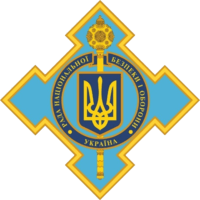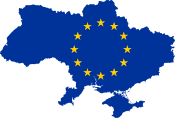Petro Poroshenko
Petro Oleksiyovych Poroshenko (Ukrainian: Петро́ Олексі́йович Пороше́нко, pronounced [peˈtrɔ olekˈs⁽ʲ⁾ijowɪtʃ poroˈʃɛnko]; born 26 September 1965)[10] is a Ukrainian businessman and politician who served as the 5th President of Ukraine from 2014 to 2019.
Petro Poroshenko | |
|---|---|
Петро Порошенко | |
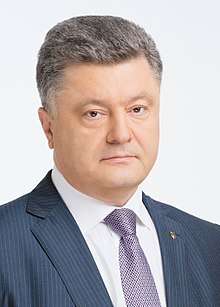 Poroshenko in 2014 | |
| 5th President of Ukraine | |
| In office 7 June 2014 – 20 May 2019 | |
| Prime Minister | Arseniy Yatsenyuk Volodymyr Groysman |
| Preceded by | Viktor Yanukovich Oleksandr Turchynov (Acting) |
| Succeeded by | Volodymyr Zelensky |
| Minister of Trade and Economic Development | |
| In office 13 March 2012 – 4 December 2012 | |
| Prime Minister | Mykola Azarov |
| Preceded by | Andriy Klyuyev |
| Succeeded by | Ihor Prasolov |
| Minister of Foreign Affairs | |
| In office 9 October 2009 – 11 March 2010 | |
| Prime Minister | Yulia Tymoshenko Oleksandr Turchynov (Acting) |
| Preceded by | Volodymyr Khandohiy |
| Succeeded by | Kostyantyn Gryshchenko |
| Secretary of the National Security and Defense Council | |
| In office 8 February 2005 – 8 September 2005 | |
| President | Viktor Yushchenko |
| Preceded by | Volodymyr Radchenko |
| Succeeded by | Anatoliy Kinakh |
| People's Deputy of Ukraine | |
| 3rd convocation | |
| In office 12 May 1998 – 14 May 2002 | |
| Constituency | Independent, Vinnytsia Oblast, District No.12[1] |
| 4th convocation | |
| In office 14 May 2003 – 8 September 2006 | |
| Constituency | Our Ukraine Bloc, Vinnytsia Oblast, District No.12[2][3] |
| 5th convocation | |
| In office 25 May 2006 – 15 June 2007 | |
| Constituency | Our Ukraine Bloc, No.33[4] |
| 7th convocation | |
| In office 12 December 2012 – 3 June 2014 | |
| Succeeded by | Oleksiy Poroshenko |
| Constituency | Independent, Vinnytsia Oblast, District No.12[5] |
| Personal details | |
| Born | Petro Oleksiyovych Poroshenko 26 September 1965 Bolhrad, Ukrainian SSR, Soviet Union |
| Political party | SDPU(O) (1998–2000)[6] PSU/S (2000–2013) PRVTSU/PR (2000–2001) NU/NSNU (2005–2012) NASTUP/BOS (2013–2014) European Solidarity (2019–present) |
| Spouse(s) | Maryna Perevedentseva |
| Children | Olexiy Yevheniya Oleksandra Mykhaylo |
| Residence | Kozyn, Kiev Oblast |
| Alma mater | Taras Shevchenko National University |
| Salary | ~€11,000, annual[7][8] |
| Net worth | |
| Signature |  |
| Military service | |
| Allegiance | |
| Branch/service | Soviet Army |
| Years of service | 1984–1986[10] |
He served as the Minister of Foreign Affairs from 2009 to 2010, and as the Minister of Trade and Economic Development in 2012. From 2007 until 2012, Poroshenko headed the Council of Ukraine's National Bank.
Outside government, Poroshenko has been a prominent Ukrainian oligarch[11] with a lucrative career in acquiring and building assets. His most recognized brands are Roshen, the large-scale confectionery company which has earned him the nickname of "Chocolate King",[11] and the TV news channel 5 kanal. Due to the scale of his business holdings in the manufacturing, agriculture and financial sectors, his political influence that included several stints at government prior to his presidency, and ownership of an influential mass-media outlet, Poroshenko has long been considered one of the prominent Ukrainian oligarchs even though not the most influential among them.
He was elected president on 25 May 2014, capturing 54.7% of the vote in the first round, thereby winning outright and avoiding a run-off. As a candidate for a second term in 2019, he obtained only 24.5% in the second round, being defeated by Volodymyr Zelensky.
Early life and education
Poroshenko's father, Oleksij Poroshenko (1936–2020[12]), was an engineer and later government official who managed multiple factories during the Soviet rule in Ukraine. Little is known about his mother Yevguenia Serguéievna Grigorchuk (1937–2004) but a Ukrainian newspaper said she was an accountant, who taught at a vocational and technical school of accounting.[13] He also spent his childhood and youth in Bendery (Moldavian Soviet Socialist Republic, now under de facto control of the unrecognized breakaway state Transnistria),[14][15] where his father Oleksij was heading a machine building plant.[14]
In his youth, Poroshenko practiced judo and sambo, and was a Candidate for Master of Sport of the USSR.[16] Despite good grades, he was not awarded the normal gold medal at graduation, and on his report card he was given a "C" for his behavior.[17] After getting into a fight with four Soviet Army cadets at the military commissariat, he was sent to army service in the distant Kazakh Soviet Socialist Republic.[17]
In 1989, Poroshenko graduated, having started studying in 1982, with a degree in economics from the international relations and law department (subsequently the Institute of International Relations) at the Kiev State University.[18] At this university he was friends with Mikheil Saakashvili who he in May 2015 would appoint as Governor of the Odessa Oblast (region) and who is a former President of Georgia.[19]
In 1984 Poroshenko married a medical student, Maryna Perevedentseva (born 1962).[16] Their first son, Oleksiy, was born in 1985 (his three other children were born in 2000 and 2001).[16]
From 1989 to 1992 Poroshenko was an assistant at the university's international economic relations department.[16] While still a student, he founded a legal advisory firm mediating the negotiation of contracts in foreign trade, and then he undertook the negotiations himself, starting to supply cocoa beans to the Soviet chocolate industry in 1991.[16] At the same time, he was deputy director of the 'Republic' Union of Small Businesses and Entrepreneurs, and the CEO "Exchange House Ukraine".[16]
Poroshenko's brother, Mykhailo, older by eight years, died in a 1997 car accident under mysterious circumstances.[20]
Business career
In 1993, Poroshenko, together with his father Oleksiy and colleagues from the Road Traffic Institute in Kiev, created the UkrPromInvest Ukrainian Industry and Investment Company, which specialized in the confectionery and automotive industries (as well as in other agricultural processing later on.)[16] Poroshenko was director-general of the company from its founding until 1998, when in connection with his entry into parliament he handed the title over to his father, while retaining the title of honorary president.[16]
Between 1996 and 1998, UkrPromInvest acquired control over several state-owned confectionery enterprises which were combined into the Roshen group in 1996, creating the largest confectionery manufacturing operation in Ukraine.[16] His business success in this industry earned him the nickname "Chocolate King".[21] Poroshenko's business empire also includes several car and bus factories, Kuznya na Rybalskomu shipyard, the 5 Kanal television channel,[22] as well as other businesses in Ukraine.
Although not the most prominent in the list of his business holdings, the assets that drew much recent media attention, and often controversy, are the confectionery factory in Lipetsk, Russia, that became controversial due to the Russian military intervention in Ukraine (2014–present), the Sevastopol Marine Plant (Sevmorzavod) that has been confiscated after the 2014 Russian forcible annexation of Crimea and the media outlet 5 kanal, particularly because of Poroshenko's repeated refusal to sell an influential media asset following his accession to presidency.
According to Poroshenko (and Rothschild Wealth Management & Trust) since becoming President of Ukraine he has relinquished the management of his businesses, ultimately (in January 2016) to a blind trust.[14][23]
Billionaires lists rankings
In March 2012, Forbes placed him on the Forbes list of billionaires at 1,153rd place, with US$1 billion.[24] As of May 2015, Poroshenko's net worth was about US$720 million (Bloomberg estimate), losing 25 percent of his wealth because of Russia's ban of Roshen products and the state of the Ukrainian economy.[25]
According to the annual ranking of the richest people in Ukraine[26] published by the Ukrainian journal Novoye Vremya and conducted jointly with Dragon Capital, a leading investment company in Ukraine, published in October 2015, president Poroshenko was found to be the only one from the top ten list whose asset value grew since the previous year's ranking. The estimate of his assets was set at US$979 million, a 20% growth, and his ranking increased from 9th to 6th wealthiest person in Ukraine. The article noted that Poroshenko remained one of the only two European leaders who owned a business empire of such scale, with Silvio Berlusconi of Italy being the other.
A total of €450 million is kept in an Amsterdam-based company registered in Cyprus, as a result of which his effective tax rate is 5% rather than the statutory tax rate of 18% in Ukraine. The company is likely to be worth much more, as the annual accounts published by the Dutch Chamber of Commerce only contain the book value of the shares, which is very likely to be lower than the market value.[27] After his election, Poroshenko lost the billionaire status as his net worth dropped by 40% to reach $705 million.[28]
Associated businesses
A number of businesses were once part of the Ukrprominvest which Poroshenko headed in 1993–1998. The investment group was dissolved in April 2012.[29] Poroshenko has stated that upon beginning his political activity he passed on his holdings to a trust fund.[16]
- Bogdan group (Poroshenko sold his share in connection with the collapse of its production after the financial crisis of 2007–2008 in 2009),[16] centered in Cherkasy
- Roshen group
- 5 Kanal and Pryamiy television channels (he denies property relations with Pryamiy[30]).
- Kuznya na Rybalskomu shipyard[16] in Kiev
- International Invest Bank,[31] owned through a trust and along with Ihor Kononenko
- Ukrprominvest-Agro, an agrarian holding
- Zorya Podillya, an agrarian company near Haisyn, specializing in sugar production from sugar beets
- Podillya
- MAS-Agro
- Ahrofirma "Dniproahrolan"
- Ahrofirma "Ivankivtsi"
- Sevastopol Shipyard (lost in 2015 due to a corporate raid by the Russian occupational authorities in Crimea)
Early political career
Poroshenko first won a seat in the Verkhovna Rada (the Ukrainian Parliament) in 1998 for the 12th single-mandate constituency. He was initially a member of the United Social Democratic Party of Ukraine (SDPU), the party led by Viktor Medvedchuk and loyal to president Leonid Kuchma at the time.[16] Poroshenko left SDPU(o) in 2000 to create an independent left-of-center faction and then a party, naming it Party of Ukraine's Solidarity (PSU).[16][32] In 2001 Poroshenko was instrumental in creating the Party of Regions, also loyal to Kuchma; the Party of Ukraine's Solidarity having merged into the Party of Regions, Poroshenko launched a new party with a similar name, the party "Solidarity.[33]
Secretary of the National Security and Defense Council
In December 2001, Poroshenko broke ranks with Kuchma supporters to become campaign chief of Viktor Yushchenko's Our Ukraine Bloc opposition faction. After parliamentary elections in March 2002 in which Our Ukraine won the biggest share of the popular vote and Poroshenko won a seat in parliament,[16][34] Poroshenko served as head of the parliamentary budget committee, where he was accused of "misplacing 47 million hryvnias" (USD$8.9 million).[35] As a consequence of Poroshenko's Our Ukraine Bloc membership tax inspectors launched an attack on his business.[16] Despite great difficulties, UkrPromInvest managed to survive until Yushchenko became President of Ukraine in 2005.[16]
Poroshenko was considered a close confidant of Yushchenko, who is the godfather of Poroshenko's daughters. Poroshenko was likely the wealthiest oligarch[11] among Yushchenko supporters, and was often named as one of the main financial backers of Our Ukraine and the Orange Revolution.[36] After Yushchenko won the presidential elections in 2004, Poroshenko was appointed Secretary of the National Security and Defense Council.[16][18]
.jpg)
In September 2005, highly publicized mutual allegations of corruption erupted between Poroshenko and Prime Minister Yulia Tymoshenko involving the privatizations of state-owned firms.[37] Poroshenko, for example, was accused of defending the interests of Viktor Pinchuk, who had acquired state firm Nikopol Ferroalloy for $80 million, independently valued at $1 billion.[38] In response to the allegations, Yushchenko dismissed his entire cabinet of ministers, including Poroshenko and Tymoshenko.[39] State prosecutors dismissed an abuse of power investigation against Poroshenko the following month,[40] immediately after Yushchenko dismissed Svyatoslav Piskun, General Prosecutor of Ukraine. Piskun claimed that he was sacked because he refused to institute criminal proceedings against Tymoshenko and refused to drop proceedings against Poroshenko.[41]
In the March 2006 parliamentary election, Poroshenko was re-elected to the Ukrainian parliament with the support of Our Ukraine electoral bloc.[16] He chaired the parliamentary Committee on Finance and Banking. Allegedly, since Poroshenko claimed the post of Chairman of the Ukrainian Parliament for himself, the Socialist Party of Ukraine chose to be part of the Alliance of National Unity because it was promised that their party leader, Oleksandr Moroz, would be elected chairman if the coalition were formed.[39] This left Poroshenko's Our Ukraine and their ally Yulia Tymoshenko Bloc out of the Government.
Poroshenko did not run in the September 2007 parliamentary election.[16] Poroshenko started heading the Council of Ukraine's National Bank in February 2007.[39][42] Between 1999 and 2012 he was a board member of the National Bank of Ukraine.[16]
Foreign Minister and Minister of Trade
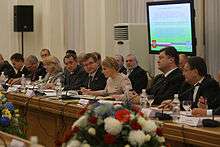
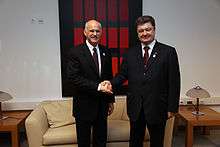
Ukrainian President Yushchenko nominated Poroshenko for Foreign Minister on 7 October 2009.[42][43] Poroshenko was appointed by the Verkhovna Rada (Ukraine's parliament) on 9 October 2009.[44][45] On 12 October 2009, President Yushchenko re-appointed Poroshenko to the National Security and Defense Council.[46] Poroshenko supported Ukrainian NATO-membership. However, he also stated NATO membership should not be a goal in itself.[47] Although Poroshenko was dismissed as foreign minister on 11 March 2010, President Viktor Yanukovych expressed hope for further cooperation with him.[22]
In late February 2012, Poroshenko was named as the new Minister of Trade and Economic Development in the Azarov Government;[48][49][50] on 9 March 2012, President Yanukovych stated he wanted Poroshenko to work in the government in the post of economic development and trade minister.[51] On 23 March 2012, Poroshenko was appointed economic development and trade minister of Ukraine by Yanukovych.[52] The same month he stepped down as head of the Council of Ukraine's National Bank.[53]
Poroshenko claims that he became Minister of Trade and Economic Development to help bring Ukraine closer to the EU and get Yulia Tymoshenko released from prison.[17] After he took the post, tax inspectors launched an attack on his business.[17]
Return to parliament
Poroshenko returned to the Verkhovna Rada (parliament) after the 2012 Ukrainian parliamentary election after winning (with more than 70%) as an independent candidate in single-member district number 12 (first-past-the-post wins a parliamentary seat) located in Vinnytsia Oblast.[54][55][56] He did not enter any faction in parliament[57] and became member of the committee on European Integration.[17] Poroshenko's father Oleksiy did intend to take part in the elections too in single-member district number 16 (also located in Vinnytsia Oblast), but withdrew his candidacy for health reasons.[58][59] In mid-February 2013, Poroshenko hinted he would run for Mayor of Kiev in the 2013 Kiev mayoral election.[60]
In 2013, the registration certificate of Solidarity was cancelled because for more than 10 years had not participated in any election.[33] Poroshenko then launched and became leader of the National Alliance of freedom and Ukrainian patriotism "OFFENSIVE" (NASTUP), which was renamed "All-Ukrainian Union Solidarity" (BOS).[33]
2014 Ukrainian revolution
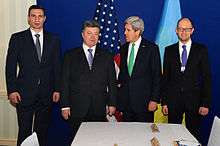
Poroshenko actively and financially supported the Euromaidan protests between November 2013 and February 2014,[16] leading to an upsurge in his popularity, although[16] he did not participate in negotiations between then President Yanukovych and the Euromaidan parliamentary opposition parties Batkivshchyna, Svoboda and UDAR.[16]
In an interview with Lally Weymouth, Poroshenko said: "From the beginning, I was one of the organizers of the Maidan. My television channel — Channel 5 — played a tremendously important role. ... At that time, Channel 5 started to broadcast, there were just 2,000 people on the Maidan. But during the night, people went by foot — seven, eight, nine, 10 kilometers — understanding this is a fight for Ukrainian freedom and democracy. In four hours, almost 30,000 people were there."[61] The BBC reported, "Mr Poroshenko owns 5 Kanal TV, the most popular news channel in Ukraine, which showed clear pro-opposition sympathies during the months of political crisis in Kiev."[11]
Poroshenko refused to join the Yatsenyuk Government (although he introduced his colleague Volodymyr Groysman, the mayor of Vinnytsia, into it), nor did he join any of the two newly created parliamentary factions Economic Development and Sovereign European Ukraine.[16]
On 24 April 2014, Poroshenko visited Luhansk, at the time not controlled by Ukrainian authorities.[14] Just like previously in Crimea he was met by a blockade of hundreds of pro-Russian locals at Luhansk Airport.[14] Poroshenko later claimed: "When I traveled to Luhansk Oblast, my car was fired at and there was an attempt to take our entire group hostage."[14]
2014 presidential campaign
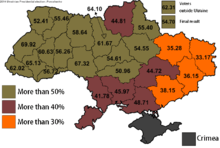
Following the 2014 Ukrainian revolution and the resulting removal of Viktor Yanukovych from the office of President of Ukraine, new presidential elections were scheduled to take place on 25 May 2014.[62] In pre-election polls from March 2014, Poroshenko garnered the most support of all the prospective candidates, with one poll conducted by SOCIS giving him a rating of over 40%.[63] On 29 March he stated that he would run for president; at the same time Vitali Klitschko left the presidential contest, choosing to support Poroshenko's bid.[64][65][66][67]
On 2 April, Poroshenko stated, "If I am elected, I will be honest and sell the Roshen Concern."[68] He also said in early April that the level of popular support for the idea of Ukraine's joining NATO was too small to put on the agenda "so as not to ruin the country."[69] He also vowed not to sell his 5 Kanal television channel.[70] On 14 April, Poroshenko publicly endorsed the campaign of Jarosław Gowin's party Poland Together of neighboring Poland in this year's elections to the European Parliament, thanking Gowin's party colleague Paweł Kowal for supporting Ukraine.[71]
Poroshenko's election slogan was: "Live in a new way – Poroshenko!".[17]
On 29 May, the Central Election Commission of Ukraine announced that Poroshenko had won 25 May presidential election, with 54.7% of the votes.[72][73][74][75][76][77]
During his visit in Berlin, Poroshenko stated that Russian separatists in the Donbass "don't represent anybody. We have to restore law and order and sweep the terrorists off the street."[78] He described as "fake" the planned 11 May Donbass status referendums.[78]
Presidency
When it became clear he had won the election on election day evening (on 25 May 2014) Poroshenko announced "My first presidential trip will be to Donbas", where armed pro-Russian rebels had declared the separatist republics Donetsk People's Republic and Luhansk People's Republic and control a large part of the region.[70][79] Poroshenko also vowed to continue the military operations by the Ukrainian government forces to end the armed insurgency claiming: "The anti-terrorist operation cannot and should not last two or three months. It should and will last hours."[80] He compared the armed pro-Russian rebels to Somali pirates.[80] Poroshenko also called for negotiations with Russia in the presence of international intermediaries.[80] Russia responded by saying it did not need an intermediary in its bilateral relations with Ukraine.[80] As president-elect, Poroshenko promised to return Crimea,[80] which was annexed by Russia in March 2014.[79][81][lower-alpha 1] He also vowed to hold new parliamentary elections in 2014.[83]
Inauguration
Poroshenko was inaugurated in the Verkhovna Rada (parliament) on 7 June 2014.[84] In his inaugural address he stressed that Ukraine would not give up Crimea and stressed the unity of Ukraine.[85] He promised an amnesty "for those who do not have blood on their hands" to the separatist and pro-Russia insurgents of the 2014 pro-Russian conflict in Ukraine and to the Ukrainian nationalist groups that oppose them, but added: "Talking to gangsters and killers is not our path".[85] He also called for early regional elections in Eastern Ukraine.[85] Poroshenko also stated that he would sign the economic part of the Ukraine–European Union Association Agreement and that this was the first step towards full Ukrainian EU Membership.[85] During the speech he stated he saw "Ukrainian as the only state language" but also spoke of the "guarantees [of] the unhindered development of Russian and all the other languages".[85] Part of the speech was in Russian.[85]
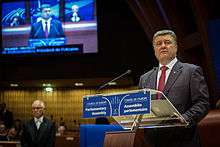
The inauguration was attended by about 50 foreign delegations, including US Vice President Joe Biden, President of Poland Bronisław Komorowski, President of Belarus Alexander Lukashenko, President of Lithuania Dalia Grybauskaitė, President of Switzerland and the OSCE Chairman-in-Office Didier Burkhalter, President of Germany Joachim Gauck, President of Georgia Giorgi Margvelashvili, Prime Minister of Canada Stephen Harper, Prime Minister of Hungary Viktor Orbán, President of the European Council Herman Van Rompuy, the OSCE Secretary General Lamberto Zannier, UN Under-Secretary-General for Political Affairs Jeffrey Feldman, China's Minister of Culture Cai Wu and Ambassador of Russia to Ukraine Mikhail Zurabov[86][87] Former Prime Minister of Ukraine Yulia Tymoshenko was also present.[85][86] After the inauguration ceremony Tymoshenko said about Poroshenko "I think Ukraine has found a very powerful additional factor of stability".[88]
Domestic policy
Peace plan for Eastern Ukraine
At the time of his inauguration, armed pro-Russian rebels, after disputed referendums, had declared the independence of the separatist Donetsk People's Republic and Luhansk People's Republic and controlled a large part of Donbass, but were largely considered to be illegitimate by the international community.[70][79] After the inauguration, Poroshenko launched a "peace" plan envisioned to garner the recognition of the presidential elections in Ukraine by Russia, consisting of a cease-fire with the separatists (named "terrorists" by Poroshenko himself) and the establishment of a humanitarian corridor for civilians ("who are not involved in the conflict").[89] Poroshenko warned that he had a "Plan B" if the initial peace plan was rejected.[90]
Decentralization of power
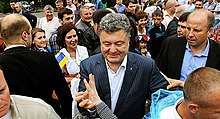
In mid-June Poroshenko started the process of amending Ukraine's constitution to achieve Ukraine's administrative decentralization.[91] According to Poroshenko (on 16 June 2014) this was "a key element of the peace plan".[91] In his draft constitutional amendments of June 2014 proposed changing the administrative divisions of Ukraine, which should include regions (replacing the current oblasts), districts and "hromadas" (united territorial communities).[92] In these amendments he also proposed that "Village, city, district and regional administrations will be able to determine the status of the Russian language and other national minority languages of Ukraine in accordance with the procedure established by the law and within the borders of their administrative and territorial units".[93] He proposed that Ukrainian remained the only state language of Ukraine.[93] Poroshenko further proposed to create the post of presidential representatives who would supervise the enforcement of the Ukrainian constitution and laws and the observation of human rights and freedoms in oblasts and raions/raions of cities.[94] In case of an "emergency situation or martial law regime" they will "guide and organize" in the territories they are stationed in.[94] Batkivshchyna, a key coalition partner in the Yatsenyuk Government, came out against the plan.[95]
He repeatedly spoken out against federalization.[96][97] and did not seek to increase his presidential powers.[98]
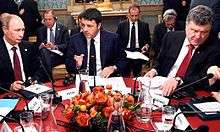
1 July 2015 decentralization draft law gave local authorities the right to oversee how their tax revenues are spent.[99] The draft law did not give an autonomous status to Donbass, as demanded by the pro-Russian rebels there, but gave the region partial self-rule for three years.[99]
Dissolution of Parliament
On 25 August 2014, Poroshenko called a snap election to the Verkhovna Rada (Ukraine's parliament), to be held 26 October 2014.[100][101] According to him this was necessary "to purify the Rada of the mainstay of [former president] Viktor Yanukovych". These deputies, Poroshenko said, "clearly do not represent the people who elected them".[102] Poroshenko also said that these Rada deputies were responsible for "the [January 2014] Dictatorship laws that took the lives of the Heavenly hundred".[102] Poroshenko also stated that many of the (then) current MPs were "direct sponsors and accomplices or at least sympathizers of militant-separatists".[102]
Poroshenko had pressed for the elections since his victory in the May 2014 presidential election.[103][104][105]
On 27 August 2014, the party congress of All-Ukrainian Party of Peace and Unity adopted a new name: "Petro Poroshenko Bloc" (BPP).[106][33][107] In 2015, the Petro Poroshenko Bloc was renamed in "Petro Poroshenko Bloc "Solidarity"".[108]
Nuclear weapons
On 13 December 2014, Poroshenko stated that he did not want Ukraine to become a nuclear power again.[109]
Decommunization and deoligarchization
.jpg)
On 15 May 2015, Poroshenko signed a bill into law that started a six months period for the removal of communist monuments and the mandatory renaming of streets and other public places and settlements with a name related to Communism.[110] According to Poroshenko "I did what I had to"; adding "Ukraine as a state has done its job, then historians should work, while the government should take care of the future".[110] Poroshenko believes that the communist repression and holodomor of the Soviet Union are on par with the Nazi crimes of the 1940s.[111] The legislation (Poroshenko signed on 15 May 2015) also provides "public recognition to anyone who fought for Ukrainian independence in the 20th century",[112] including the controversial Ukrainian Insurgent Army (UPA) combatants led by Roman Shukhevych and Stepan Bandera.[110]
Poroshenko said in an interview with Germany's Bild newspaper that "If I am elected, I'll wipe the slate clean and will sell the Roshen concern. As president of Ukraine, I will and want to only focus on the well-being of the nation."[113]
On 23 March 2015, Ukrainian President Petro Poroshenko accepted the resignation of billionaire Ihor Kolomoisky as governor of Dnipro region over the control of oil companies.[114] "There will be no more oligarchs in Ukraine," Poroshenko said adding that "oligarchs must pay more [taxes] than the middle class and more than small business." The president underscored that "the program of de-oligarchization will be put into life". Poroshenko promised that he will fight against the Ukrainian oligarchs.[115]
In December 2018, President Poroshenko confirmed the status of veterans and combatants for independence of Ukraine for the armed units of the Organization of Ukrainian Nationalists (OUN) and the Ukrainian Insurgent Army (UPA).[116]
Language policy
In 2016, a New rule came into force requiring Ukraine's radio stations to play a quota of Ukrainian-language songs each day. The law also requires TV and radio broadcasters to ensure 60% of programs such as news and analysis are in Ukrainian.[117]
On 25 September 2017, a new law on education was signed by President Poroshenko (draft approved by Rada on 5 September 2017) which says that the Ukrainian language is the language of education at all levels except for one or more subjects that are allowed to be taught in two or more languages, namely English or one of the other official languages of the European Union. The law stipulates a 3-year transitional period to come in full effect.[118][119] In February 2018 this period was extended until 2023.[120] The law was condemned by PACE that called it "a major impediment to the teaching of national minorities".[121] The law also faced criticism from officials in Hungary, Romania and Russia.[122] (Hungarian and Romanian are official languages of the European Union, Russian is not.[123][124]) Ukrainian officials stressed that the new law complies fully with European norms on minority rights.[125]
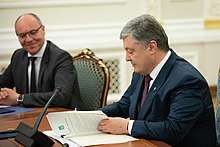
The law does state that "Persons belonging to indigenous peoples of Ukraine are guaranteed the right to study in public facilities of preschool and primary education in the language of instruction of the respective indigenous people, along with the state language of instruction" in separate classes or groups.[119] PACE describes this as a significant curtailing of the rights of indigenous peoples carried out without consultations with their representatives.[121] On 27 June 2018 Ukrainian foreign minister Pavlo Klimkin stated that following the recommendation of the Venice Commission the language provision of the (September 2017) law on education will not apply to private schools and that every public school for national minorities "will have broad powers to independently determine which classes will be taught in Ukrainian or their native language."[126][127]
On 15 May 2019, Poroshenko signed the law "On provision of the functioning of the Ukrainian language as the State language"[128][129][nb 1]
Religious policy
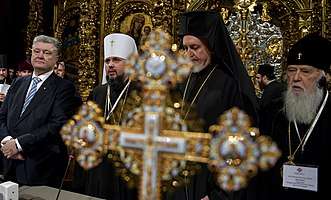
Under Poroshenko the autocephalous Orthodox Church of Ukraine was created by the merging of the UOC-KP and the UAOC, and two members of the UOC-MP in a unification council which also elected Epiphanius I as its first primate. The 11 October 2018 announcement by Ecumenical Patriarchate that it would – among other things – grant autocephaly to a Ukrainian church is one of the reasons which created the Moscow–Constantinople schism when the Moscow Patriarchate severed full communion with the Ecumenical Patriarchate on 15 October 2018.
Corruption
Corruption in Ukraine is a widespread problem; although there are signs that during Poroshenko presidency it decreased (thanks to the Prozorro digital system).[131] Poroshenko has signed a decree to create the National Anti-Corruption Bureau of Ukraine to comply with the requirements of the International Monetary Fund. Since 2015, the Bureau has sent 189 cases to court, but no one significant was convicted. The head of the Special Anti-Corruption Prosecutor's Office reportedly coached suspects on how to avoid corruption charges.[132]
A November 2018 EU Commission report praised some of Ukraine's reforms during Poroshenko's presidency, such as in healthcare, pensions and public administration.[133] But judicial reforms were too slow, the report claimed, and "there have been only few convictions in high-level corruption cases so far".[133] It also stated that too often attacks on civil society activists went unpunished.[133]
During Poroshenko's 2019 campaign for reelection a major scandal broke out in which business partners of Poroshenko (but not Poroshenko himself) were accused of smuggling Russian components to Ukrainian defense factories at wildly inflated prices.[134][133]
Critics of Poroshenko have pointed out that he removed jurisdiction of the National Anti-Corruption Bureau of Ukraine over records about off-the books payments to Paul J. Manafort who lobbied on behalf of former Ukraine president Viktor Yanukovych and served as campaign manager for Donald Trump during his presidential campaign.[135] Moreover, Poroshenko stripped of Ukrainian citizenship Mikheil Saakashvili who criticized him for not fighting Ukrainian corruption.[136]
On 11 April 2019, the High Anti-Corruption Court of Ukraine was established and Poroshenko signed the decree appointing the judges during an official ceremony.[137]
Foreign policy
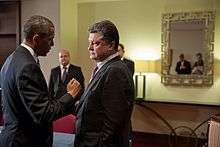
United States
On 7 December 2015, Poroshenko had a meeting with U.S. Vice President Joe Biden in Kiev to discuss Ukrainian-American cooperation.[138] He met Donald Trump in June 2017; the BBC falsely accused him of paying Trump's lawyer Michael Cohen between 400,000 and 600,000 dollars to organize this meeting.[139][140] The BBC ended up having to state the allegation was untrue, apologizing to Poroshenko, deleting the article from its website, paying legal costs, and paying damages to Poroshenko.[141][142]
Russia
In June 2014, Poroshenko forbade any cooperation with Russia in the military sphere.[143]
At the Parliamentary Assembly of the Council of Europe on 26 June 2014 Poroshenko stated that bilateral relations with Russia cannot be normalized unless Russia undoes its unilateral annexation of Crimea and returns its control of Crimea to Ukraine.[144]
On Poroshenko's June 2014 Peace plan for Eastern Ukraine, Russian Foreign Minister Sergei Lavrov commented "it looks like an ultimatum".[90]
On 26 August 2014, Poroshenko met with Russian President Vladimir Putin in Minsk where Putin called on Ukraine not to escalate its offensive. Poroshenko responded by demanding Russia halt its supplying of arms to separatist fighters. He said his country wanted a political compromise and promised the interests of Russian-speaking people in eastern Ukraine would be considered.[145]
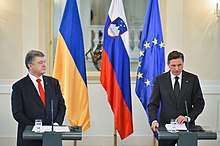
European Union
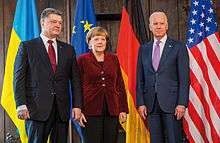
The European Union (EU) and Ukraine signed the economic part of the Ukraine–European Union Association Agreement on 27 June 2014.[146] Poroshenko stated that the day was "Ukraine's most historic day since independence in 1991", describing it as a "symbol of faith and unbreakable will".[146] He saw the signing as the start of preparations for Ukrainian EU Membership.[146]
NATO
_38.jpg)
At his speech at the opening session of the new parliament on 27 November 2014, Poroshenko stated "we've decided to return to the course of NATO integration" because "the nonalignment status of Ukraine proclaimed in 2010 couldn't guarantee our security and territorial integrity".[147] The Ukrainian parliament on 23 December 2014 voted 303 to 8 to repeal a 2010 bill that had made Ukraine a non-aligned state in a bill submitted by Poroshenko.[148] On 29 December 2014 Poroshenko vowed to hold a referendum on joining NATO.[149] On 22 September 2015 Poroshenko claimed that "Russia's aggressive actions" proved need for the enlargement of NATO and that the Ukrainian referendum on joining NATO would be held after "every condition for the Ukrainian compliance with NATO membership criteria" was met by "reforming our country".[150]
On 2 February 2017, in an interview with Funke Mediengruppe, Poroshenko announced he was planning a referendum on whether Ukraine should join NATO.[151]
International
Poroshenko was criticized by Committee to Protect Journalists for signing a decree which banned 41 international journalists and bloggers from entering Ukraine for one year, being labeled as threats to national security.[152] The list includes three BBC journalists, and two Spanish journalists currently missing in Syria, all of whom previously covered the Ukraine crisis.[153]
In October 2015, Poroshenko visited the Kazakh capital of Astana, during which he told President Nursultan Nazarbayev that his country was the Ukraine's "window to Asia" and vise versa.[154] During a visit to Gomel, Belarus in October 2018, he spoke to the Ukrainian community on the situation in Ukraine, saying that he does "not want Russia to use Belarus to get to our flank".[155]
Political career after losing 2019 Presidential election
In the July 2019 Ukrainian parliamentary election, Poroshenko is placed first on the party list of European Solidarity.[156]
Law enforcers' raid at Poroshenko's headquarters and gym
On 20 December 2019 the law enforcers raided both Poroshenko's party headquarters and gym. Hidden cameras and recording devices were found inside the gym's smoke detectors and security alarms. According to the State Investigation Bureau those were allegedly secretly recording and filming Poroshenko's gym clients, of which are politicians and businessmen. Poroshenko and Ihor Kononenko, deputy head of Poroshenko's party, are both owners of said gym and could not be reached for comment. The raid was part of two ongoing criminal investigations which are focused on two concerns. First, the alleged theft of servers with classified information. Second, the alleged tax evasion and money laundering.[157]
Derkach fragments
In May 2020, Andriy Derkach, a Ukrainian lawmaker who is aligned with a pro-Russian faction and has links to Russian intelligence, released edited fragments of private phone calls from several years between then-U.S. Vice President Joe Biden (the presumptive Democratic nominee for U.S. president) and then-President Poroshenko. Derkach used the clips to make a series of accusations not supported by the tapes.[158] The taped conversations were consistent with official U.S. and European policy at the time and with public statements by Biden and Poroshenko.[158] Derkach had met with Rudolph W. Giuliani in December 2019.[158] Derkach's maneuver raised questions about foreign interference in the 2020 U.S. elections, and echoed Russian government's interference into the 2016 election.[158] Biden's campaign and Poroshenko's political party European Solidarity described Derkach's act (which was publicized by the Russian state-controlled network RT) as a Russian attempt to harm Biden and disparage Ukraine.[158]
Panama Papers
Poroshenko set up an offshore company in the British Virgin Islands during the peak of the war in Donbass.[159] Leaked documents from the Panama Papers show that Poroshenko registered the company, Prime Asset Partners Ltd, on 21 August 2014. Records in Cyprus show him as the firm's only shareholder.[160] He said that he had done nothing wrong, and the legal firm, Avellum, overseeing the sale of Roshen, Poroshenko's confectionery company, said that "any allegations of tax evasion are groundless". The anti-corruption group Transparency International believes that the "creation of businesses while serving as president is a direct violation of the constitution".[161]
His name was cited in the list of politicians named in "Paradise Papers" allegations.[162]
Personal life
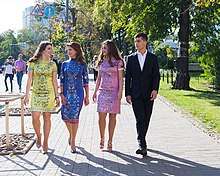
Poroshenko has been married to Maryna since 1984.[16] The couple have four children: Olexiy (born 1985), the twins Yevheniya and Oleksandra (born 2000) and Mykhailo (born 2001).[16] Olexiy was a representative in the regional parliament of Vinnytsia Oblast.[17] In November 2014, he became People's Deputy of Ukraine.[163] Maryna Poroshenko is a cardiologist, who does not take part in public life, apart from her participation in the activities of the Petro Poroshenko Charity Foundation.[16] Poroshenko became a grandfather on the day of his presidential inauguration of 7 June 2014.[164]
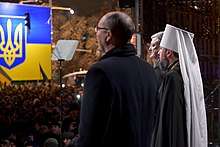
Poroshenko is a member of the Ukrainian Orthodox Church.[37][17] Poroshenko has financed the restoration of its buildings and monasteries.[37] In high-level meetings he is often seen with a crucifix.[37]
Poroshenko speaks fluent Ukrainian, Russian, English and Romanian.[165]
Cultural and political image
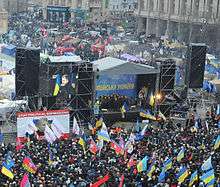
Poroshenko has been nicknamed "Chocolate King" because of his ownership of a large confectionery business.[11] Poroshenko objected to being called an oligarch, stating that "Oligarchs are people who seek power in order to further enrich themselves. But I have long fought against bandits who are robbing our country and have destroyed free enterprise".[17]
After promising during his election campaign to sell his business assets when elected as the president of Ukraine, according to Poroshenko and Rothschild Wealth Management & Trust, since becoming President of Ukraine, he has relinquished the management of his businesses, ultimately (in January 2016) to a blind trust.[14][23]
Potential implementation of martial law
During his speeches Poroshenko on numerous occasions has called the war in East Ukraine a "Patriotic War",[167][168][169] yet did not initiate implementation of martial law, for which he was criticized on numerous occasions by politicians and the general public.[170][171] Poroshenko noted that it is necessary to realize the consequences of martial law for the country:
- it will restrict the supply of weaponry and items of dual assignment;
- the IMF won't provide funds to countries that are in war.[172]
A month later the last statement was refuted by a head of the IMF Ukrainian branch Jerome Vacher, "As for the possible introduction of martial law, the IMF has no formal legal restrictions that impede continuation of mutual cooperation under such conditions. We have already worked with a number of countries where war conflicts of various intensity unfolded".[173]
On 5 February 2015, in his interview with the Spanish El Pais, Poroshenko stated that he will introduce martial law in the case of an escalation of the situation in Donbas, but that such a decision will limit democracy and liberties as well as threaten the development of the economy.[174][175]
Martial law in Ukraine was introduced for 30 days in late November 2018, after the Kerch Strait incident.[176]
Connections with Dmytro Firtash
In April 2015, Ukrainian oligarch Dmytro Firtash at a court session about his extradition to the United States stated that at the Ukrainian presidential election he financially supported Poroshenko,[177] and Vitali Klitchko in the Kiev city mayoral election.[177]
Mikheil Saakashvili
_03.jpg)
On 29 May 2015, Poroshenko invited former President of Georgia and his friend Mikheil Saakashvili to help with conducting reforms in the Ukraine and granted him Ukrainian citizenship.[178] The very next day after receiving citizenship on 30 May 2015, Saakashvili was appointed by the president as head (governor) of the Odessa Regional State Administration (see Governor of Odessa Oblast).[179] However, on 26 July 2017 Poroshenko issued a decree[nb 2] stripping Saakashvili of his Ukrainian citizenship, without providing any reason. According to The Economist, most observers saw Poroshenko's stripping Saakashvili of his citizenship "simply as the sidelining of a political rival" (Saakashvili started a political party Movement of New Forces to participate in upcoming elections).[181][136]
New year vacationing (2018)
In January 2018, journalists from Radio Free Europe reported that during Poroshenko's New Year's vacation starting 1 January 2018 on the Maldives, there were ten people who spent $500,000 to rent separate islands and the most expensive hotel in the country.[182][183] On 30 March 2018, Poroshenko submitted his income declaration. Poroshenko declared that he spent between 1.3 and 1.4 million UAH on this vacation – two times less than journalists had reported (some details about the president's vacation were classified).[184][183]
Awards

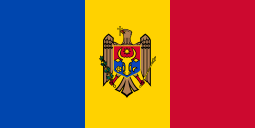





- Ecumenical Patriarchate: cross of Panagia Pammakaristos (5 January 2019)[186]
- Orthodox Church of Ukraine: Order of St. Andrew Pervozvannyi[187][188] (Pervozvannyi meaning "The First-Called")
See also
- Rudy Giuliani
- Lev Parnas and Igor Fruman
- Trump–Ukraine scandal
Notes
- The status of the Crimea and of the city of Sevastopol is currently under dispute between Russia and Ukraine; Ukraine and the majority of the international community consider the Crimea to be an autonomous republic of Ukraine and Sevastopol to be one of Ukraine's cities with special status, while Russia, on the other hand, considers the Crimea to be a federal subject of Russia and Sevastopol to be one of Russia's three federal cities.[79][82]
- Hungarian Foreign Minister Péter Szijjártó said the law was "unacceptable" and part of an "anti-Hungarian policy" of Poroshenko.[130]
- The decree was not made publicly available "in accordance with the legislation on personal data protection".[180]
References
- "People's Deputy of Ukraine of the III convocation". Official portal (in Ukrainian). Verkhovna Rada of Ukraine. Archived from the original on 5 April 2015. Retrieved 22 December 2014.
- "People's Deputy of Ukraine of the IV convocation". Official portal (in Ukrainian). Verkhovna Rada of Ukraine. Archived from the original on 13 January 2016. Retrieved 22 December 2014.
- "Registered candidates". Elections of the People's Deputies of Ukraine (in Ukrainian). Central Election Commission of Ukraine. Archived from the original on 1 January 2015. Retrieved 24 December 2014.
- "People's Deputy of Ukraine of the V convocation". Official portal (in Ukrainian). Verkhovna Rada of Ukraine. Archived from the original on 8 June 2015. Retrieved 22 December 2014.
- "People's Deputy of Ukraine of the VII convocation". Official portal (in Ukrainian). Verkhovna Rada of Ukraine. Archived from the original on 13 January 2016. Retrieved 22 December 2014.
- Ruzhynskyi, Serhiy (28 May 2014). What there is necessary to know about the President Petro Poroshenko (Що варто знати про президента Петра Порошенка). IPress.ua
- "XE: Convert UAH/EUR. Ukraine Hryvnia to Euro Member Countries". xe.com. Retrieved 26 November 2018.
- Кабмин утвердил (in Russian). bigmir.net. 1 August 2016. Archived from the original on 2 August 2016.
- "Ukraine's President Lost Billionaire Status in Office and More". 10 June 2019 – via bloomberg.com.
- "Petro Poroshenko's biography". Archived from the original on 10 February 2017. Retrieved 22 January 2019.
- "Profile: Ukraine's President Petro Poroshenko". BBC. 7 June 2014. Archived from the original on 26 May 2014. Retrieved 10 March 2016.
- (in Ukrainian) Poroshenko's father died, Ukrayinska Pravda (16 June 2020)
- Матір та старший брат Петра Порошенка – білі плями біографії майбутнього Президента (in Ukrainian). Vinbazar. 5 June 2014.
- All In The Family: The Sequel Archived 29 November 2016 at the Wayback Machine, Kyiv Post (7 October 2016)
- Marcin Kosienkowski (2012). "Continuity and Change in Transnistria's Foreign Policy after the 2011 Presidential Elections". Academia.edu. p. 38.
- Tadeusz A. Olszański; Agata Wierzbowska-Miazga (28 May 2014). "Poroshenko, President of Ukraine". OSW, Poland. Archived from the original on 8 March 2016. Retrieved 10 March 2016.
- "Ukraine Election: The Chocolate King Rises". Spiegel Online. 22 May 2014. Archived from the original on 28 May 2014.
- "Ukraine's tycoon Poroshenko confirms plans to sell assets". ITAR-TASS. 26 May 2014. Archived from the original on 27 May 2014. Retrieved 26 May 2014.
- (in Ukrainian) Saakashvili took over as head of the Odessa Regional State Administration, Deutsche Welle (30 May 2015)
- (in Russian)/(website has automatic Google Translate option) Short bio Archived 5 March 2013 at the Wayback Machine, LIGA
- Abram Brown (31 March 2014). "The Willy Wonka of Ukraine Is Now The Leading Presidential Candidate". Forbes. Archived from the original on 1 December 2008. Retrieved 19 April 2014.
- "Poroshenko is not going to sell Channel 5 TV". Kyiv Post. 23 May 2010. Archived from the original on 25 May 2010. Retrieved 25 May 2010.
- Roshen quits activity of its factory in Lipetsk Archived 20 January 2017 at the Wayback Machine, Interfax-Ukraine (20 January 2017)
- Brian Bonner (8 March 2012). "Eight Ukrainians make Forbes magazine's list of world billionaires". Kyiv Post. Archived from the original on 1 December 2008. Retrieved 8 March 2012.
- "Billionaire No More: Ukraine President's Fortune Fades With War". Bloomberg Business. 8 May 2015. Archived from the original on 26 May 2015. Retrieved 22 May 2015.
- Vitaliy Sych (30 October 2015). Порошенко растет, Ахметов падает – свежий Топ-100 самых богатых украинцев [Poroshenko grows, Akhmetov falls – Fresh Top 100 richest Ukrainians] (in Russian). Novoe Vremia. Archived from the original on 11 March 2016. Retrieved 10 March 2016.
- "Alle schimmige geldstromen belastingontwijkende President Oekraïne in één handig overzicht". 24 November 2016. Archived from the original on 15 April 2017. Retrieved 9 July 2017.
- "Poroshenko lost billionaire status during presidency – media". unian.info. 20 May 2019. Retrieved 21 May 2019.
- Концерн "Укрпромінвест" оголосив про ліквідацію [Concern "Ukrprominvest" announced its liquidation] (in Ukrainian). UNIAN. 24 April 2012. Archived from the original on 1 December 2008. Retrieved 26 May 2014.
- "Poroshenko says attempts underway to raid Pryamiy TV, denies ties with channel". News Agency. Interfax. Retrieved 15 August 2019.
- Komakha, O. "The Poroshenko's Bank is growing in 10 times faster (Банк Порошенко растет в 10 раз быстрее)". Minprom Information Agency. 16 October 2014
- Kuzio, Taras; Frishberg, Alex (21 February 2008). "Ukrainian Political Update" (PDF). Frishberg & Partners, Attorneys at Law. p. 22. Archived (PDF) from the original on 3 March 2016.
- Петро Порошенко виходить на роботу [Poroshenko goes to work]. Ukrayinska Pravda (in Ukrainian). 6 June 2014. Archived from the original on 3 March 2016.
- "Results of voting in single-mandate constituencies". Central Election Commission of Ukraine. Retrieved 23 June 2010.
- Freedom House (2004). Nations in Transit 2004: Democratization in East Central Europe and Eurasia. Rowman & Littlefield Publishers. pp. 638–. ISBN 978-1-4617-3141-2. Archived from the original on 13 January 2016.
- Hanly, Ken (25 May 2014). "Op-Ed: Petro Poroshenko the oligarch poised to become Ukraine president". Digital Journal. Archived from the original on 27 May 2014. Retrieved 26 May 2014.
- Luke Harding and Oksana Grytsenko (23 May 2014). "Chocolate tycoon heads for landslide victory in Ukraine presidential election". The Guardian. Archived from the original on 9 June 2014.
"The Return of the Prodigal Son, Who Never Left Home". The Ukrainian Week. 30 March 2012. Archived from the original on 30 October 2013. Retrieved 17 June 2014.
"Who will lead Ukrainian Orthodox Church (Moscow Patriarchate) and where?". Den. 27 February 2014. Archived from the original on 28 February 2014. Retrieved 17 June 2014. - Alex Rodriguez (27 September 2005). "In Ukraine, old whiff of scandal in new regime". Chicago Tribune. Archived from the original on 2 October 2013.
- "Biography" (in Russian). Korrespondent.net. Archived from the original on 19 July 2006.
- "Prosecutors Close Criminal Case Against Yushchenko's Close Ally". Kiev Ukraine News Blog. 21 October 2005. Archived from the original on 7 April 2014. Retrieved 6 April 2014.
- Tammy M. Lynch (28 October 2005). "Independent standpoint on Ukraine:Dismissal of Prosecutor-General, Closure of Poroshenko Case Create New". ForUm. Archived from the original on 3 November 2013. Retrieved 3 March 2012.
- "Regions Party not to vote for Poroshenko's appointment Ukraine's foreign minister". Kyiv Post. Interfax-Ukraine. 8 October 2009. Archived from the original on 5 June 2011. Retrieved 8 October 2009.
- "Ukrainian president proposes Petro Poroshenko for foreign minister". Interfax-Ukraine. 7 October 2009. Archived from the original on 11 March 2016.
- "Rada appoints Poroshenko Ukraine's foreign minister". Interfax-Ukraine. 9 October 2009. Archived from the original on 23 May 2012. Retrieved 5 December 2009.
- By 240 out of 440 MPs registered in the session hall. In particular, 151 MPs of the Bloc of Yulia Tymoshenko faction, 63 of the Our Ukraine-People's Self-Defense Bloc, 20 members of the Bloc of Volodymyr Lytvyn, one deputy of the Party of Regions, one member of the Communist Party faction, and four deputies not belonging to any faction voted for the nomination.
- "Poroshenko put on Ukraine's NSCD". Kyiv Post. Interfax-Ukraine. 12 October 2009. Archived from the original on 19 April 2014.
- "Poroshenko: Ukraine could join NATO in 1–2 years, with political, public will". Kyiv Post. Interfax-Ukraine. 4 December 2009. Archived from the original on 30 January 2011. Retrieved 5 December 2009.
- "Mass Media:Poroshenko heads Ministry of Economy". UNIAN. 23 February 2012. Archived from the original on 24 February 2012. Retrieved 9 March 2012.
- "Regions Party: Poroshenko appointed economy minister, Kolobov appointed finance minister". Kyiv Post. Interfax-Ukraine. 23 February 2012. Archived from the original on 9 March 2012. Retrieved 9 March 2012.
- "President:Prime Minister nominated Petro Poroshenko for Minister of Economy". President.gov.ua. 23 February 2012. Archived from the original on 28 January 2014. Retrieved 3 March 2012.
- "Ukrainian president wants Poroshenko to head economic development and trade ministry". Kyiv Post. Interfax-Ukraine. 9 March 2012. Archived from the original on 9 March 2012. Retrieved 9 March 2012.
- "Poroshenko appointed economic development and trade minister of Ukraine". Kyiv Post. Interfax-Ukraine. 23 March 2012. Archived from the original on 1 December 2008. Retrieved 23 March 2012.
"Poroshenko explains reasons behind accepting economy minister's post". Kyiv Post. Interfax-Ukraine. 23 March 2012. Archived from the original on 23 March 2012. Retrieved 23 March 2012. - Порошенко Петр Алексеевич [Petr Aleksiyovych Poroshenko] (in Russian). LIGA.net. Archived from the original on 5 March 2013. Retrieved 20 February 2013.
- (in Ukrainian) Candidates single-mandate constituency № 12 Archived 5 June 2014 at the Wayback Machine, RBC Ukraine
- Полтавська область. Одномандатний виборчий округ №112 [Vinnytsia region. The single-mandate constituency № 12] (in Ukrainian). Central Election Commission of Ukraine. Archived from the original on 21 February 2014. Retrieved 14 December 2012.
- "Minister Poroshenko and his father registered as self-nominees for Vinnytsia region". Kyiv Post. Interfax-Ukraine. 15 August 2012. Archived from the original on 20 December 2012. Retrieved 14 December 2012.
- "Poroshenko not intending to join any faction". Kyiv Post. Interfax-Ukraine. 12 December 2012. Archived from the original on 14 December 2012. Retrieved 14 December 2012.
"Poroshenko fears uncontrolled economic situation in Ukraine due to foreign borrowing". Kyiv Post. Interfax-Ukraine. 20 June 2013. Archived from the original on 23 September 2013. Retrieved 20 June 2013. - (in Ukrainian) Candidates single-mandate constituency № 16, RBC Ukraine
- "Poroshenko's father changes his mind to withdraw his candidacy from elections". UNIAN. 25 September 2012. Archived from the original on 4 September 2014.
- "Poroshenko appears set to join race for Kyiv mayor". Ukraine Business Online. 12 February 2013. Archived from the original on 19 April 2014. Retrieved 15 February 2013.
- "Interview with Ukrainian presidential candidate Petro Poroshenko". The Washington Post. 25 April 2014. Archived from the original on 4 June 2014.
- "Ukraine: Speaker Oleksandr Turchynov named interim president". BBC News. 23 February 2014. Archived from the original on 27 March 2014. Retrieved 29 March 2014.
"Ukraine protests timeline". BBC News. 23 February 2014. Archived from the original on 19 February 2014. Retrieved 29 March 2014. - Главная | Центр соціальних та маркетингових досліджень SOCIS Archived 21 May 2014 at the Wayback Machine. Socis.kiev.ua. Retrieved 28 May 2014.
- "Klitschko will run for mayor of Kyiv". Interfax-Ukraine. 29 March 2014. Archived from the original on 30 March 2014. Retrieved 29 March 2014.
- "Klitschko believes only presidential candidate from democratic forces should be Poroshenko". Interfax-Ukraine. 29 March 2014. Archived from the original on 11 October 2014. Retrieved 29 March 2014.
- Colin Freeman (29 March 2014). "Petro Poroshenko, the billionaire chocolate baron hoping to become Ukraine's next president". The Daily Telegraph. Archived from the original on 30 March 2014. Retrieved 29 March 2014.
- "Ukraine: former boxer Vitaliy Klitschko ends presidential bid and backs Poroshenko". Euronews. 29 March 2014. Archived from the original on 30 March 2014.
- "Poroshenko ready to sell Roshen if elected president". Interfax-Ukraine. 2 April 2014. Archived from the original on 7 April 2014. Retrieved 2 April 2014.
- "Question of Ukraine's membership of NATO may split country – Poroshenko". Interfax-Ukraine. 2 April 2014. Archived from the original on 7 April 2014. Retrieved 2 April 2014.
- "Poroshenko Declares Victory in Ukraine Presidential Election". The Wall Street Journal. 25 May 2014. Archived from the original on 28 May 2014. Retrieved 29 May 2014.
- "Polska Razem czarnym koniem? Mocne słowa Gowina" [Polish Total black horse? Strong words Gowin] (in Polish). 12 April 2014. Archived from the original on 15 April 2014. Retrieved 14 April 2014.
- "Poroshenko wins presidential election with 54.7% of vote – CEC". Interfax-Ukraine. 29 May 2014. Archived from the original on 29 May 2014.
- "Ukraine talks set to open without pro-Russian separatists". The Washington Post. 14 May 2014. Archived from the original on 28 May 2014. Retrieved 29 May 2014.
- "Ukraine elections: Runners and risks". BBC News. 22 May 2014. Archived from the original on 27 May 2014. Retrieved 29 May 2014.
- "Q&A: Ukraine presidential election". BBC News. 7 February 2010. Archived from the original on 29 April 2014. Retrieved 29 May 2014.
- "Poroshenko wins presidential election with 54.7% of vote – CEC". Radio Ukraine International. 29 May 2014. Archived from the original on 29 May 2014. Retrieved 29 May 2014.
Внеочередные выборы Президента Украины [Results election of Ukrainian president] (in Russian). Телеграф. 29 May 2014. Archived from the original on 29 May 2014. Retrieved 29 May 2014. - "New Ukrainian president will be elected for 5-year term – Constitutional Court". Interfax-Ukraine. 16 May 2014. Archived from the original on 17 May 2014. Retrieved 29 May 2014.
- "Poroshenko: 'No negotiations with separatists'". Deutsche Welle. 8 May 2014. Archived from the original on 24 May 2014.
- "Ukraine crisis timeline". BBC News. Archived from the original on 30 May 2014. Retrieved 29 May 2014.
- "Poroshenko promises calm 'in hours' amid battle to control Donetsk airport". The Guardian. 26 May 2014. Archived from the original on 29 May 2014. Retrieved 29 May 2014.
- "EU & Ukraine 17 April 2014 FACT SHEET" (PDF). European External Action Service. 17 April 2014. Archived from the original (PDF) on 14 May 2014. Retrieved 29 May 2014.
- Gutterman, Steve; Polityuk, Pavel (18 March 2014). "Putin signs Crimea treaty, will not seize other Ukraine regions". Reuters. Archived from the original on 29 March 2014. Retrieved 26 March 2014.
- "In Ukrainian election, chocolate tycoon Poroshenko claims victory". The Washington Post. 25 May 2014. Archived from the original on 4 September 2014.
- Lukas Alpert (29 May 2014). "Petro Poroshenko to Be Inaugurated as Ukraine President June 7". The Wall Street Journal. Archived from the original on 29 May 2014. Retrieved 29 May 2014.
"Rada decides to hold inauguration of Poroshenko on June 7 at 1000". Interfax-Ukraine. 3 June 2014. Archived from the original on 3 June 2014. Retrieved 3 June 2014.
"Poroshenko sworn in as Ukrainian president". Interfax-Ukraine. 7 June 2014. Archived from the original on 1 July 2014. Retrieved 7 June 2014. - "Ukraine president vows not to give up Crimea". The Guardian. theguardian.com. 7 June 2014. Archived from the original on 13 June 2014.
"Ukraine's Poroshenko sworn in and sets out peace plan". BBC News. 7 June 2014. Archived from the original on 9 June 2014.
"Excerpts from Poroshenko's speech". BBC News Online. 7 June 2014. Archived from the original on 8 June 2014.
"Ukraine's President Poroshenko pushes for peace at inauguration". Euronews. 7 June 2014. Archived from the original on 9 June 2014.
"Poroshenko offers escape for rebels but no compromise over weapons". Euronews. 7 June 2014. Archived from the original on 1 July 2014.
Промова президента України під час церемонії інавгурації. Повний текст [Speech by President of Ukraine during the inauguration ceremony. Full text]. Ukrayinska Pravda (in Ukrainian). 7 June 2014. Archived from the original on 7 June 2014. - На інавгурацію Порошенка прибудуть делегації з 56 країн [At the inauguration Poroshenko come delegations from 56 countries]. Ukrayinska Pravda (in Ukrainian). 7 June 2014. Archived from the original on 9 June 2014. Retrieved 7 June 2014.
- "Ukraine: International recognition for President Poroshenko". Euronews. 7 June 2014. Archived from the original on 8 July 2014. Retrieved 7 June 2014.
- Тимошенко: президент Порошенко – потужний фактор стабільності [Tymoshenko: President Poroshenko – a powerful factor of stability]. Ukrayinska Pravda (in Ukrainian). 7 June 2014. Archived from the original on 9 June 2014. Retrieved 7 June 2014.
- "Poroshenko doesn't rule out roundtable in Donetsk involving parties to conflict". Interfax-Ukraine. 12 June 2014. Archived from the original on 1 July 2014. Retrieved 12 June 2014.
- "Poroshenko warns of 'detailed Plan B' if Ukraine ceasefire fails". Al Jazeera. 22 June 2014. Archived from the original on 1 July 2014.
- "Amendments to Ukraine's Constitution to be tabled in parliament this week – Poroshenko". Interfax-Ukraine. 16 June 2014. Archived from the original on 1 July 2014.
- "Poroshenko suggests granting status of regions to Crimea, Kyiv, Sevastopol, creating new political subdivision of 'community'". Interfax-Ukraine. 26 June 2014. Archived from the original on 1 July 2014. Retrieved 26 June 2014.
- "Authorities in Ukrainian regions may be allowed to determine status of national minority languages". Interfax-Ukraine. 26 June 2014. Archived from the original on 1 July 2014. Retrieved 26 June 2014.
- "Ukrainian president proposes to appoint representatives to regions". Interfax-Ukraine. 26 June 2014. Archived from the original on 1 July 2014. Retrieved 26 June 2014.
- "Ukraine's Poroshenko names new defence chiefs in shake-up". Reuters. 3 July 2014. Archived from the original on 3 July 2014.
- "Documents signed in Minsk don't envision federalization, autonomy for Donbas – Poroshenko Archived 24 February 2015 at the Wayback Machine". Interfax-Ukraine. 12 February 2015.
- Poroshenko rules out federalization of Ukraine Archived 24 June 2015 at the Wayback Machine. Interfax-Ukraine. 23 June 2015.
Ukraine to remain unitary state after constitution is amended – Poroshenko Archived 27 June 2015 at the Wayback Machine. Interfax-Ukraine. 26 June 2015. - Semi-presidential form of government is optimal for Ukraine – Poroshenko Archived 2 August 2015 at the Wayback Machine. Interfax-Ukraine. 30 June 2015.
- Poroshenko Unveils Constitutional Changes, Radio Free Europe (1 July 2015)
- "Ukraine President Poroshenko Calls Snap General Election". Bloomberg News. 25 August 2014. Archived from the original on 25 August 2014.
- "Ukraine crisis: President calls snap vote amid fighting". BBC News. 25 August 2014. Archived from the original on 27 August 2014. Retrieved 30 August 2014.
- Ukrainian President dissolves Parliament, announces early elections Archived 31 August 2014 at the Wayback Machine, United Press International (25 August 2014)
"Ukraine's Petro Poroshenko Dissolves Parliament, Sets Election Date". The Moscow Times. 26 August 2014. Archived from the original on 27 August 2014.
President's address on the occasion of early parliamentary elections of 26 October, Presidential Administration of Ukraine (25 August 2014) - "Poroshenko hopes early parliamentary elections in Ukraine will take place in October". Interfax-Ukraine. 26 June 2014. Archived from the original on 27 October 2014. Retrieved 30 August 2014.
- "Poroshenko hopes for early parliamentary elections in Ukraine this fall – presidential envoy". Interfax-Ukraine. 19 June 2014. Archived from the original on 18 October 2014. Retrieved 30 August 2014.
- "In Ukrainian election, chocolate tycoon Poroshenko claims victory". The Washington Post. 25 May 2014. Archived from the original on 4 September 2014. Retrieved 30 August 2014.
- "Poroshenko wants coalition to be formed before parliamentary elections". Interfax-Ukraine. 27 August 2014. Archived from the original on 3 July 2014. Retrieved 30 August 2014.
"Solidarity Party to be renamed Bloc of Petro Poroshenko – congress". Interfax-Ukraine. 27 August 2014. Archived from the original on 31 August 2014. - Порошенко і порожнеча (in Ukrainian). 16 May 2014. Archived from the original on 30 August 2014. Retrieved 30 August 2014.
- "Bloc of Petro Poroshenko to change name". Ukrinform.net. 10 March 2015. Archived from the original on 11 January 2016. Retrieved 6 November 2015.
- Ukraine has no ambitions to become nuclear power again – Poroshenko Archived 14 December 2014 at the Wayback Machine, Interfax-Ukraine (13 December 2014)
- Poroshenko signed the laws about decommunization Archived 23 April 2016 at the Wayback Machine. Ukrayinska Pravda. 15 May 2015
Poroshenko signs laws on denouncing Communist, Nazi regimes Archived 19 August 2016 at the Wayback Machine, Interfax-Ukraine. 15 May 20
Poroshenko: Time for Ukraine to resolutely get rid of Communist symbols Archived 18 May 2015 at the Wayback Machine, UNIAN. 17 May 2015
Goodbye, Lenin: Ukraine moves to ban communist symbols Archived 7 March 2016 at the Wayback Machine, BBC News (14 April 2015) - Порошенко: час очистити Україну від комуністичних символів [Poroshenko: time to clear Ukraine of communist symbols]. BBC Ukrainian (in Ukrainian). 17 May 2015. Archived from the original on 13 January 2016. Retrieved 30 March 2016.
- "Ukraine to rewrite Soviet history with controversial 'decommunisation' laws Archived 23 July 2016 at the Wayback Machine". The Guardian. 20 April 2015.
- "Poroshenko to Sell Roshen If Elected Ukrainian President: Bild Archived 22 March 2017 at the Wayback Machine". Bloomberg. 2 April 2014.
- "Powerful Ukrainian Governor Kolomoyskiy Resigns". RadioFreeEurope/RadioLiberty. 25 March 2015. Retrieved 9 June 2015.
- "IN UKRAINE THERE WILL BE NO MORE OLIGARCHS – POROSHENKO". 5.ua. 30 May 2015. Archived from the original on 1 June 2015. Retrieved 30 May 2015.
- "Poroshenko enacts law granting fighters for Ukraine's independence in 20th century combatant status". UNIAN. 23 December 2018.
- "Language quotas for Ukraine radio shows". 8 November 2016 – via www.bbc.com.
- "New education law becomes effective in Ukraine". unian.info.
- Про освіту | від 5 September 2017 № 2145-VIII (Сторінка 1 з 7)
- "Ukraine agrees to concessions to Hungary in language row". unian.info.
- "PACE – Resolution 2189 (2017) – The new Ukrainian law on education: a major impediment to the teaching of national minorities' mother tongues". assembly.coe.int.
- "Ukrainian Language Bill Facing Barrage Of Criticism From Minorities, Foreign Capitals". RadioFreeEurope/RadioLiberty.
- "Consolidated version of Regulation No 1 determining the languages to be used by the European Economic Community" (PDF). Europa. European Union. Retrieved 30 July 2010.
- "Languages of Europe – Official EU languages". European Commission. Retrieved 27 June 2016.
- "Hungary in language dispute with Ukraine". 10 October 2017 – via bbc.com.
- Hungary realizes Ukraine not to change education law – Klimkin, UNIAN (27 June 2018)
- Debate on language provisions of Ukraine’s education law not over – minister, UNIAN (12 January 2018)
- "Poroshenko enacts Ukraine's language law". www.unian.info. 15 May 2019. Retrieved 15 May 2019.
- "President signed the law on the official language: Language is a platform on which the nation and state are built". Official website of the President of Ukraine. 15 May 2019. Retrieved 20 May 2019.
- "Hungary criticizes Ukrainian language law". 112.international. 26 April 2019. Retrieved 20 May 2019.
- 'Corruption in Ukraine has to be stopped', BBC news (20 March 2019)
- "Want to Know What's Next in Russian Election Interference? Pay Attention to Ukraine's Elections". Lawfare. 28 March 2019.
- Ukraine election: Why comic Zelenskiy is real threat to Poroshenko, BBC news (27 March 2019)
- This Graft Scandal May Be Too Much Even for Ukraine, Bloomberg News (27 February 2019)
- Ukrainine's President sidelines opponent by stripping his citizenship by Andrew Kramer, New York Times
- Why Ukraine is losing the war on corruption by Mikheil Saakashvili
- "Ukraine's President Creates Anti-Corruption Court". RadioFreeEurope/RadioLiberty. 11 April 2019. Retrieved 8 May 2019.
- "Meeting Poroshenko and Biden: main results". nv.ua. 8 December 2015. Archived from the original on 9 December 2015. Retrieved 8 December 2015.
- Wood, Paul (23 May 2018). "Ukraine 'paid Trump lawyer for talks'". Archived from the original on 10 January 2019. Retrieved 26 November 2018 – via www.bbc.com.
- Paul Wood (23 May 2018). "Trump lawyer 'paid by Ukraine' to arrange White House talks". BBC. Archived from the original on 24 May 2018. Retrieved 29 March 2019.
Donald Trump's personal lawyer, Michael Cohen, received a secret payment of at least $400,000 (£300,000) to fix talks between the Ukrainian president and President Trump
- "BBC pays damages to Ukraine President Petro Poroshenko over report". BBC. 28 March 2019. Retrieved 29 March 2019.
"We apologise to Mr Poroshenko for any distress caused and have agreed to pay him damages, legal costs and have participated in a joint statement in open court," the broadcaster said.
- "BBC to pay 'substantial' damages to Ukrainian president over false allegations he authorised corrupt payment to meet Trump". The Independent. 2 March 2019. Retrieved 6 June 2019.
Jane Phillips, counsel for the BBC, said: “The BBC is happy to acknowledge that these claims about the claimant are completely untrue, and it is here, through me, to apologise to the claimant for any distress and embarrassment caused to him by the article and the broadcast.
- Порошенко заборонив будь-яку співпрацю з Росією у військовій сфері [Poroshenko forbade any cooperation with Russia in the military sphere]. Ukrayinska Pravda (in Ukrainian). 16 June 2014. Archived from the original on 17 June 2014. Retrieved 16 June 2014.
- "Ukraine cannot normalize relations with Russia without return of Crimea, says Poroshenko". Interfax-Ukraine. 26 June 2014. Archived from the original on 27 June 2014. Retrieved 26 June 2014.
- "Eastern Ukraine tensions figure in Putin and Poroshenko talks". Moscow News. 26 August 2014. Archived from the original on 3 September 2014. Retrieved 28 August 2014.
- "EU signs pacts with Ukraine, Georgia and Moldova". BBC News. 27 June 2014. Archived from the original on 27 June 2014. Retrieved 27 June 2014.
- A Tilt Toward NATO in Ukraine as Parliament Meets Archived 22 March 2017 at the Wayback Machine, The Wall Street Journal (27 November 2014)
- "Ukraine has no alternative to Euro-Atlantic integration – Poroshenko". Interfax-Ukraine. 23 December 2014. Archived from the original on 4 March 2016. Retrieved 30 March 2016.
"Ukraine abolishes its non-aligned status – law". Interfax-Ukraine. 23 December 2014. Archived from the original on 24 December 2014. Retrieved 30 March 2016.
"Ukraine's complicated path to NATO membership". Euronews. 23 December 2014. Archived from the original on 4 March 2016. Retrieved 30 March 2016.
"Ukraine Takes Step Toward Joining NATO". New York Times. 23 December 2014. Archived from the original on 22 March 2017. Retrieved 30 March 2016.
"Ukraine Ends 'Nonaligned' Status, Earning Quick Rebuke From Russia". The Wall Street journal. 23 December 2014. Archived from the original on 4 March 2016. Retrieved 30 March 2016. - "New Year, new hope as Ukraine paves way for NATO membership". Euronews. 30 December 2014. Archived from the original on 4 March 2016. Retrieved 30 March 2016.
- "Russia's actions prove need for NATO expansion – Poroshenko". Interfax-Ukraine. 22 September 2015. Archived from the original on 8 April 2016. Retrieved 30 March 2016.
"Decision on referendum regarding Ukraine's membership in NATO to be made after reforms – Poroshenko". Interfax-Ukraine. 22 September 2015. Archived from the original on 8 April 2016. Retrieved 30 March 2016.
"Ukraine-NATO cooperation is crucially important for global security due to Russian aggression – Poroshenko". Interfax-Ukraine. 22 September 2015. Archived from the original on 8 April 2016. Retrieved 30 March 2016. - NATO calls on Russia to stop violence in Ukraine Archived 24 February 2017 at the Wayback Machine, Al Jazeera (2 February 2017)
- "Ukraine bans 41 international journalists and bloggers". CPJ. 16 September 2015. Archived from the original on 13 January 2016. Retrieved 10 March 2016.
- Umberto Bacchi (17 September 2015). "Ukraine: BBC boss slams 'shameful' ban on international journalists". International Business Times. Archived from the original on 4 March 2016. Retrieved 10 March 2016.
- "Poroshenko: Kazakhstan is 'window to Asia' for Ukraine, while Ukraine is 'window to Europe' for Kazakhstan". www.ukrinform.net. Retrieved 11 April 2020.
- "Ukrainian President: we do not want Russia to attack us through Belarus". UAWire. Retrieved 11 April 2020.
- "Десятка партії Порошенка: Парубій, Геращенко, Джемілєв". Українська правда.
- Sorokin, Oleksiy (2 December 2019). "Law enforcers search Poroshenko's party headquarters and gym". KyivPost. Archived from the original on 4 January 2020. Retrieved 4 January 2020.
- Sonne, Paul; Helderman, Rosalind S. (19 May 2020). "Ukrainian lawmaker releases leaked phone calls of Biden and Poroshenko". Washington Post.
- Polityuk, Pavel; Prentice, Alessandra (4 April 2016). "Ukraine's Poroshenko defends record after Panama leaks". Reuters. Archived from the original on 7 April 2016. Retrieved 7 April 2016.
- "Ukraine's leader set up secret offshore firm as battle raged with Russia". Guardian. 4 April 2016. Archived from the original on 7 April 2016. Retrieved 7 April 2016.
- "Panama Papers: Ukraine President Poroshenko denies tax claims". BBC News. 4 April 2016. Retrieved 7 April 2016.
- "Explore The Politicians in the Paradise Papers – ICIJ". ICIJ. Retrieved 6 December 2017.
- Sputnik. "Poroshenko's Son Becomes Ukrainian Parliament Member: Election Commission". sputniknews.com. Archived from the original on 20 December 2016. Retrieved 13 December 2016.
- Порошенко став дідом [Poroshenko has become a grandfather]. Ukrayinska Pravda (in Ukrainian). 7 June 2014. Archived from the original on 8 June 2014. Retrieved 7 June 2014.
- "Petro Poroshenko, discurs in limba romana la Cernauti". Hotnews.ro. Retrieved 26 October 2014.
- "Who Does Putin Want as Ukrainian President?". Retrieved 26 November 2018.
- Poroshenko: this war will enter the history as patriotic (Порошенко: Ця війна увійде в історію як вітчизняна). Ukrayinska Pravda. 24 August 2014
- Today in Ukraine takes place the 2014 Patriotic War, – Poroshenko (Сьогодні в Україні йде вітчизняна війна 2014 року, – Порошенко). TVi. 4 October 2014
- Poroshenko: I believe in a victory of the 2014 Patriotic War (Порошенко: вірю у перемогу у Вітчизняній війні 2014 року). Radio Liberty. 28 October 2014
- Is there a need to implement a martial law? (Чи треба запроваджувати воєнний стан?) BBC Ukraine. 28 August 2014
- Maidan and battalions are requesting for Poroshenko to implement martial law in Donbas (Майдан та батальйони вимагають від Порошенка запровадити воєнний стан на Донбасі). Vgolos. 29 June 2014
- Poroshenko explained why cannot implement martial law (Порошенко пояснив, чому не можна вводити воєнний стан). UApress. 23 July 2014
- IMF will continue support for Ukraine in case of introduction of martial law (МВФ продовжить підтримку України в разі введення воєнного стану). Ukr.media. 29 October 2014
- (Порошенко объявит военное положение в случае эскалации конфликта). LB.ua. 5 February 2015
- Poroshenko: if conflict will expand, there may be a martial law across whole country (Порошенко: Якщо конфлікт наростатиме, може бути воєнний стан по всій країні). Ukrayinska Pravda. 5 February 2015
- Martial laws comes to an end in Ukraine after 30 days, BBC News (26 December 2018)
- Firtash: We got Poroshenko as a president, Klychko as a mayor as we all wanted (Фирташ: Мы получили Порошенко президентом, Кличко – мэром, как и хотели). Mirror Weekly. 30 April 2015
- Poroshenko, P. "About granting a Ukrainian citizenship to Saakashvili M. as a person granting whom the citizenship of Ukraine poses a state interest for Ukraine (Про прийняття до громадянства України Саакашвілі М. як особи, прийняття якої до громадянства України становить державний інтерес для України)". Presidential ukase № 301/2015. 29 May 2015
- Poroshenko, P. About appointment of M.Saakashvili as a head of Odessa Oblast State Administration. Presidential ukase № 304/2015. 30 May 2015
- Decree on stripping Saakashvili of Ukraine citizenship not to be published – Bankova, UNIAN: (27 July 2017)
- "Ukraine strips one of its president's rivals of his citizenship". The Economist. 28 July 2017. Retrieved 29 July 2017.
- "Mr. Petro Incognito. Таємна відпустка президента Порошенка (розслідування)". Радіо Свобода (in Ukrainian). Retrieved 6 April 2018.
- Порошенко на новорічні свята був у Києві, Івано-Франківську та на Мальдівах (in Ukrainian). Retrieved 6 April 2018.
- "Перегляд декларації | ЄДИНИЙ ДЕРЖАВНИЙ РЕЄСТР ДЕКЛАРАЦІЙ". public.nazk.gov.ua. Retrieved 6 April 2018.
- Custodian of the Two Holy Mosques and President of Ukraine Attend Signing Ceremony of Draft Cooperation Program and Memoranda of Understanding between the Two Countries, Saudi Press Agency.
- "President presented a high state award to Ecumenical Patriarch Bartholomew". Official website of the President of Ukraine. 5 January 2019. Retrieved 5 January 2019.
- "Почесний Патріарх Філарет нагородив Порошенка церковним орденом". risu.org.ua. 10 January 2019. Retrieved 10 January 2019.
- Філарет вручив Порошенку орден Андрія Первозванного. www.ukrinform.ua (in Ukrainian). 10 January 2019. Retrieved 12 January 2019.
External links
![]()
- Official website for the President of Ukraine
- "Personal website" (in Ukrainian). Archived from the original on 2 February 2014. Retrieved 8 October 2009.
- Euromaidan Overview
- Appearances on C-SPAN
Further reading
- Bohdan, Ben, "Five years of Poroshenko’s presidency: main achievements and failures ", 19 April 2019, Euromaidan Press.
| Government offices | ||
|---|---|---|
| Preceded by Volodymyr Radchenko |
Secretary of the National Security and Defense Council 2005 |
Succeeded by Anatoliy Kinakh |
| Political offices | ||
| Preceded by Volodymyr Khandohiy |
Minister for Foreign Affairs 2009–2010 |
Succeeded by Kostyantyn Gryshchenko |
| Preceded by Andriy Klyuyev |
Minister of Trade and Economic Development 2012 |
Succeeded by Ihor Prasolov |
| Preceded by Oleksandr Turchynov Acting |
President of Ukraine 2014–2019 |
Succeeded by Volodymyr Zelensky |
